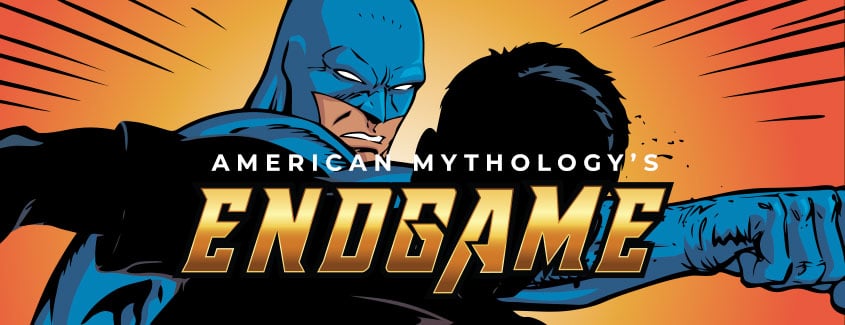
The largest cultural event of 2019 is the release of Marvel’s Avengers: Endgame, a movie that culminates a decade of story-telling and that’s seemingly destined to make more money at the box-office than any other (even if it required a “re-release” while still in movie theatres to achieve it). Its record-breaking performance suggests that if you were planning on seeing it you already have. This article will be spoiler-filled for those who haven’t seen the film yet, but still wish to participate in watercooler conversations.
While famous for its ensemble cast, Endgame’s essential hero is Tony “I am Iron Man” Stark, a “genius, billionaire, playboy, philanthropist” who is not prone to “make the sacrifice play.” The story arc of Endgame answers the question of whether Tony will sacrifice himself for others. And, he does—just as he has in every previous film. Admittedly, this time his self-sacrifice appears to be final, but his willingness to do so has not been in question for over a decade, though apparently people like to pretend that it is.
Perhaps one can’t blame Marvel for returning perpetually to such a proven well, but in retelling Stark’s story, the filmmakers missed an opportunity for a truly weighty question of sacrifice. For when we meet our heroes, the villain Thanos had completed his life’s mission of destroying half the life forms in the universe—something made possible only through his sacrifice of his beloved daughter. Stark’s mission then is to reverse Thanos’ act, but five years have passed since the decimation and Stark has picked up the pieces of his life, married, and had a daughter in that time. To undo Thanos’ action, time travel will be required and logically then the parallel sacrifice of Stark’s daughter. However, the filmmakers ducked the issue by immediately establishing that in 21st century notions of time travel, we can have our cake and eat it too. Stark can undo Thanos’ evil action, but not his daughter. Might we pretend the same thing when pursuing our more temperate goals? The filmmakers don’t dare ask.
Captain America is the second most important hero in the tale and the exemplar of duty, sacrifice, and the greatest generation’s traditional values. He’s from the past and always does the right thing—whether this means giving up the love of his life to save the world or “tsking” his fellow heroes for using mildly profane language. As the story’s moral compass, it is Captain America that must meet with approval (and no shock) 2019’s casual embrace of homosexuality. The filmmakers deemed this “first” interjection of homosexuality into the Marvel Universe so important that one of the directors played the role as he undermined his own story’s coherence for the sake of a political point. Furthermore, at the film’s conclusion someone must time-travel one last time to minimize the negative ramifications of messing with the space-time continuum. Of course, Captain America is sent, but—completely out of character—he refuses to return so that he can selfishly live out the idyllic life he had dreamed of with his previously lost love. Here again, the cost of his long-standing sacrifice is wiped out (as are logically his love’s current life with husband and children), but, in 2019 terms, “love” wins.
Finally, one other character sacrificed life to defeat Thanos—a sacrifice that could have been far more profound if current sentiments allowed. Natasha Romanoff, or “Black Widow,” is the primary female protagonist and when martyrdom is required to reverse Thanos’ devilry, she physically fights her best friend and fellow superhero Hawkeye to be the sacrificial lamb. Moving stuff until one gives some consideration to the situation. Romanoff is single and has previously shared her anguish over being sterilized while Hawkeye is a loving family man with young children at home. Hawkeye is a soldier committed to sacrificing himself for others, but he clearly has much more to lose and much more to do in this life than does Black Widow. A moving line for her—“let me give you your children”—practically writes itself while he would have wrestled with balancing his honor code, which demands sacrifice, especially for women and children, with his concomitant duty to family. In 2019, however, Hollywood rejects these traditional values and so replaces the potential drama with a silly fight where a petite woman with no superpowers beats a professional male soldier so that she can kill herself in a relatively empty gesture.
Endgame is the mythology of America’s young. Earlier generations looked to John Wayne, but today it is Marvel; and Endgame’s official message paraphrased is “be who you are, not who you are supposed to be.” That has ramifications, so don’t be the last to know.

